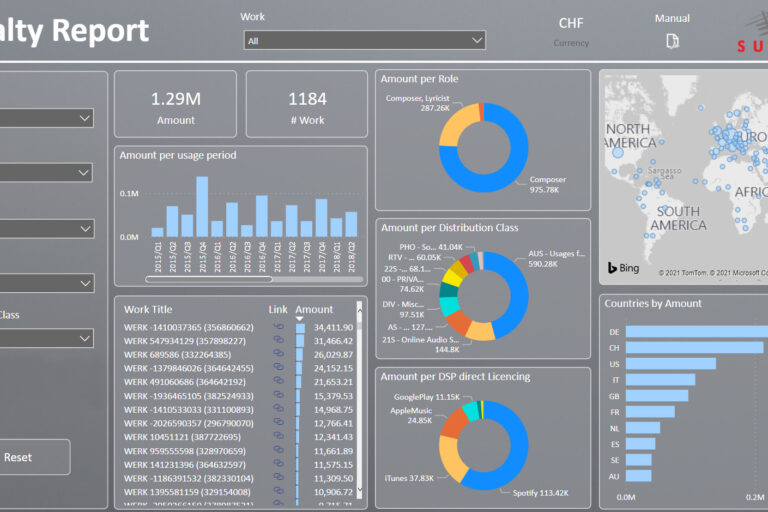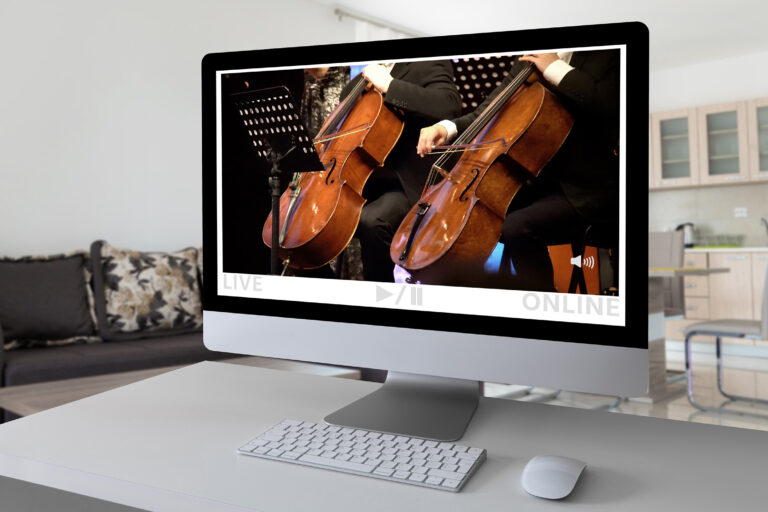The video-game industry has been chalking up continuous growth for years. The corona crisis gave earnings in this sector an additional boost. Never before have so many people consumed video games, whether on their smartphones, tablets, consoles, or PCs.
Although music plays a significant part in this success story, video-game producers have so far only cooperated with collective management organisations in isolated cases. Instead, the producers have worked directly with authors and artists who do not belong to a collective management organisation, which has enabled them to sign what are known as “buy-out dealsˮ.
This is mostly still the case today. To improve its members’ competitive chances in this flourishing market, SUISA has prepared a new addendum to the rights management agreement.
In a buy-out, the author transfers all their rights of use in their works to the producer against payment of a single lump-sum amount. As a result, once the purchase price is paid, the author is not entitled to any further revenues from royalties or neighbouring rights. As a rule, members of collective management organisations cannot sign buy-out agreements because they have transferred their rights of use to their collective management organisation. The very purpose of the collective management organisation is to ensure that its members receive royalties for every new use of their works. Clearly, a compromise had to be found in the case of video games (see text).
Basic principles
What music rights must a video-game producer acquire?
To produce or reproduce a video game, the producer must acquire the following rights:
- Synchronisation right: This is the right to set an audiovisual work (in this case, a video game) to music. SUISA members (or their publishers) may settle the synchronisation rights directly with the video-game producer.
- Reproduction and physical distribution rights: These rights are necessary to reproduce a musical work on a video or data carrier and to distribute the recording thereafter. SUISA manages the reproduction and distribution rights. The new addendum provides that these rights may be excluded from the rights administration agreement (for more, see the section “New Addendum to the Rights Administration Agreement for SUISA members”).
- Online rights (download and streaming): Nowadays, most games are also – or only – sold on Internet for the buyer to download. In order to make a game available for downloading, the video-game producer or the online distributor (e.g. the platforms Steam or Origin) need to acquire a downloading licence.
Certain video games can only be played by streaming on a browser, for example. This then requires a streaming licence.
SUISA manages these online rights. Such rights cannot be excluded from the rights administration agreement by the addendum. - Neighbouring rights: Neighbouring rights are the rights of the performers and the rights in the sound recording. These two rights are collectively referred to as “Master Rights”.
Authors who play their compositions themselves and produce their own recordings may licence these rights, as a performer and recording producer combined, directly to the video-game producer for all uses. Otherwise, the owner of the Master Rights must license them separately to the video-game producer. SUISA does not manage these rights.
For legal questions relating to video games, please contact our Legal Department: legalservices (at) suisa (dot) ch
New Addendum to the Rights Administration Agreement for SUISA members
Buy-outs are, as we stated above, customary practice for video-game producers. This has repeatedly placed SUISA members at a competitive disadvantage on the video-game music market because of their membership. Producers have preferred to work with authors who do not belong to a collective management organisation and who can therefore freely dispose of their rights.
The new addendum is designed to eliminate the competitive disadvantage for our members while maintaining the basic fundamentals of collective management. Since buy-outs cannot be reconciled with the basic principles of fair and usage-based remuneration, SUISA has opted for a compromise solution.
The new addendum to the rights administration agreement enables SUISA members for the first time to settle the synchronisation, reproduction, and distribution rights for commissioned compositions in one package directly with the video-game producers. At the same time, SUISA will continue to manage online uses like downloads or streamings – as is also the case in the film sector.
All other rights of use remain with SUISA in accordance with the rights administration agreement. Thus, when music from a video game is broadcast on the radio or performed at events, for example, SUISA will assert the rights of its member composer.
In practice, for the reproduction and distribution rights to be excluded from the rights administration agreement, the following criteria must be satisfied:
- the work must be a commissioned composition. Pre-existing works that have already been published cannot be excluded from the rights administration agreement.
- • When the work is commissioned, the following particulars must be communicated to SUISA:
• title of the work and video game;
• playing time of the work;
• name and address of the principal;
• name and address of the game producer;
• nature and aim of the game. - The exclusion cannot apply to games which are used by a company for advertising, sponsoring or other purposes in association with presentations about the company itself or its products and services.
The Addendum can be obtained from the Members’ Department: authors (at) suisa (dot) ch
Licences and tariffs
What fees does SUISA apply for online uses?
Online platforms (domestic*)
These licence fees apply to online platforms offering video games for streaming or downloading.
| Downloads | 2% of total revenues | Minimum fee Generally CHF 500 per 100,000 downloads or streams |
| Subscription | 2% of total revenues | Minimum fee CHF 0.15 per subscriber per month |
*The licensing for international platforms like Steam, Uplay, Playstation Store etc. is handled through our subsidiary SUISA Digital Licensing AG.
Other online uses (e.g. game-playing via live-streaming or browser)
The following licence fees only apply if the producer or publisher itself distributes the game (e.g. via its own website):
| General | 2% of total revenues | Minimum fee A. Music only in the game menu and intro or outro sequences CHF 400 per 100,000 downloads or streams B. Games with in-game background music CHF 500 per 100,000 downloads or streams C. Games with a focus on music CHF 600 per 100,000 downloads or streams |
| Advertising games | 2% of total revenues | Minimum fee A. Music only in the game menu and intro or outro sequences CHF 800 per 100,000 downloads or streams B. Games with in-game background music CHF 1,000 per 100,000 downloads or streams C. Games with a focus on music CHF 1,200 per 100,000 downloads or streams |
What fees does SUISA apply for reproduction and distribution rights?
Since video games are audiovisual productions, Tariff VI applies. The main points of this tariff are:
Physical reproduction for sale
- 3.3% of the retail sales price, or of costs (if the game is distributed for free)
- 4.4% of the actual invoiced price (AIP) if the customer has concluded a multiannual contract with SUISA covering royalty settlements and can furnish to SUISA the breakdown of its sales with the number of units and sales price per audiovisual recording per accounting period. The AIP is the price invoiced by the customer to the retailer or, if the customer does not distribute the recordings itself, the actual wholesale price invoiced by the customer’s official distributor.
- The applicable rate is reduced as follows:
storage space of the protected music to total storage capacity of the carrier
(e.g. 500 MB protected music to 2000 MB storage capacity of the carrier = 75% fee reduction) - Minimum fee:
• 29 centimes per game with music, regardless of its playing time,
• 2.2 centimes per minute of music and per audiovisual recording, subject to a maximum of 29 centimes per audiovisual recording if the customer provides SUISA with an accurate breakdown of the music in the game.
Special case: Commissioned music by SUISA members
If a member of SUISA composes commissioned music for a game and signs the Video Game Addendum to the Rights Administration Agreement, the licence fee can be negotiated directly with the game producer without involving SUISA.
Production music mark-up
The use of production music managed by SUISA is subject to the following mark-ups:
- for the synchronisation right: 50%
- for neighbouring rights:
• 50% of the total remuneration for the reproduction rights under Tariff VI (see above) and the synchronisation rights if the game is distributed only in Switzerland and Liechtenstein.
• 100% of the total remuneration for the reproduction rights under Tariff VI (see above) and the synchronisation rights if the game is distributed internationally.
For video-game licensing or inquiries, please contact: customerservices (at) suisa (dot) ch




